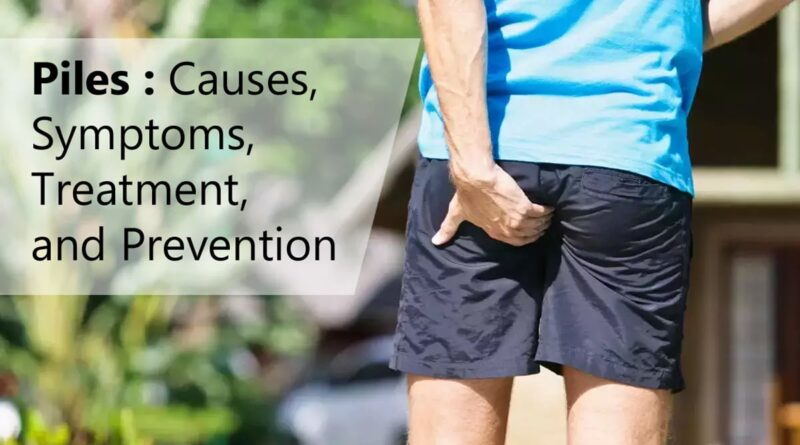Piles: Causes, Symptoms, Treatment, and Prevention
Introduction
Piles, also known as hemorrhoids, are a common medical condition that affects many individuals worldwide. They are swollen blood vessels in the anal and rectal area that can cause discomfort and pain. This article will explore the causes, symptoms, treatment options, and preventive measures for piles.
What are Piles?
Piles, or hemorrhoids, are swollen blood vessels that develop in the anal and rectal area. They can be internal, occurring inside the rectum, or external, forming under the skin around the anus. Piles can vary in size and severity, and they are often associated with symptoms such as bleeding, itching, and discomfort during bowel movements.
Causes of Piles
Several factors contribute to the development of piles. These include:
- Chronic constipation or diarrhea
- Straining during bowel movements
- Prolonged sitting or standing
- Obesity
- Pregnancy
- Aging
- Hereditary factors
Types of Piles
There are two main types of piles:
- Internal Piles: These occur inside the rectum and are usually painless. They may cause bleeding during bowel movements and can protrude through the anus.
- External Piles: These develop under the skin around the anus and can be painful. They may cause itching, swelling, and irritation.
Signs and Symptoms of Piles
The common signs and symptoms of piles include:
- Bright red blood on toilet paper or in the toilet bowl after bowel movements
- Itching and irritation around the anus
- Pain and discomfort during bowel movements
- Swelling and lumps around the anus
- Mucus discharge
Diagnosis of Piles
To diagnose piles, a healthcare professional will take a detailed medical history and perform a physical examination of the anal and rectal area. Additional diagnostic procedures, such as proctoscopy or anoscopy, may be conducted to assess the severity of the condition.

Treatment Options for Piles
Treatment for piles depends on the severity and symptoms experienced by the individual. The following treatment options are available:
- Lifestyle Changes and Home Remedies: This includes increasing fiber intake, drinking an adequate amount of water, avoiding straining during bowel movements, and practicing good anal hygiene.
- Medications and Ointments: Over-the-counter creams, ointments, and suppositories can help relieve symptoms such as itching and discomfort. Oral medications may also be prescribed to manage pain and inflammation.
- Minimally Invasive Procedures: Procedures such as rubber band ligation, sclerotherapy, and infrared coagulation can be used to treat internal piles. These procedures are minimally invasive and are performed on an outpatient basis.
- Surgical Interventions: In severe cases or when other treatment methods have failed, surgical interventions such as hemorrhoidectomy or stapled hemorrhoidopexy may be necessary.
Prevention of Piles
The following preventive measures can help reduce the risk of developing piles:
- Maintain a high-fiber diet with plenty of fruits, vegetables, and whole grains.
- Drink an adequate amount of water to prevent constipation.
- Engage in regular physical exercise to improve bowel movements.
- Avoid excessive straining during bowel movements.
- Take breaks from prolonged sitting or standing.
Tips for Managing Piles
In addition to medical treatment and preventive measures, the following tips can help manage the symptoms of piles:
- Keep the anal area clean by gently washing with warm water.
- Use over-the-counter creams or ointments containing witch hazel or hydrocortisone to reduce itching and inflammation.
- Apply cold compresses or ice packs to the affected area to alleviate pain and swelling.
FAQ
What are the common causes of piles?
Piles can be caused by factors such as chronic constipation, straining during bowel movements, pregnancy, and obesity.
How long does it take for piles to heal?
The healing time for piles varies depending on the severity of the condition and the treatment methods used. Mild cases may resolve within a few days, while severe cases may take several weeks or longer to heal.
Can piles be prevented during pregnancy?
Piles are common during pregnancy due to increased pressure on the blood vessels. However, adopting healthy lifestyle habits, such as maintaining a high-fiber diet and staying hydrated, can help prevent or minimize the occurrence of piles.
Are there any natural remedies for piles?
Some natural remedies, such as applying aloe vera gel, witch hazel, or coconut oil to the affected area, may provide temporary relief from symptoms. However, it is essential to consult a healthcare professional for proper diagnosis and treatment.
When should I consult a doctor for piles?
It is advisable to consult a doctor if you experience persistent or severe symptoms of piles, such as excessive bleeding, intense pain, or the inability to pass stools.
Conclusion
Piles, or hemorrhoids, can cause significant discomfort and inconvenience. Understanding the causes, symptoms, treatment options, and preventive measures can help individuals manage this condition effectively. By adopting a healthy lifestyle, seeking timely medical attention, and following the advice of healthcare professionals, individuals can alleviate the symptoms of piles and improve their overall quality of life.


